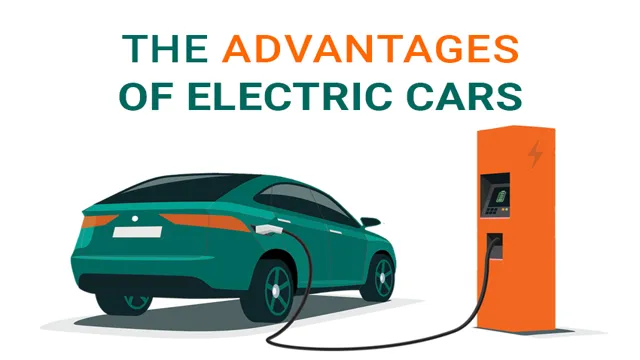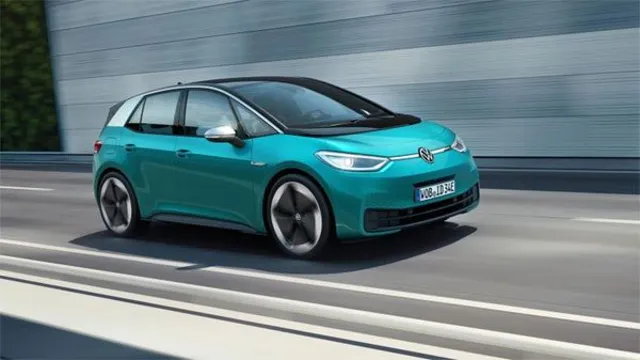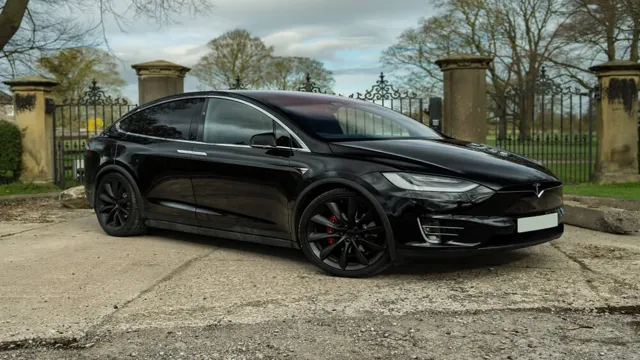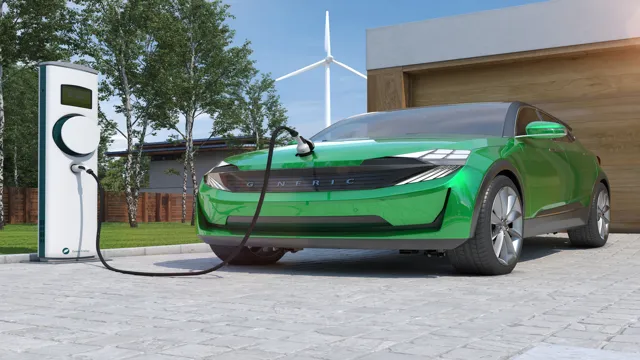Revolutionize Your Commute: The Astonishing Benefits of Electric Cars as a Benefit in Kind
If you’re considering purchasing an electric car, it’s important to understand the financial implications that may come along with it. One aspect that many electric car owners may not be aware of is the Benefit in Kind (BIK) tax. BIK tax is a tax on personal use of a company vehicle, and for electric cars, it is usually lower than it is for petrol or diesel cars.
In this blog, we will explore the benefits of the BIK tax for electric cars, and how it can save you money in the long run. So, buckle up, and let’s explore the world of BIK tax for electric cars.
What is Benefit in Kind?
Benefit in kind, commonly known as BIK, is a tax that employees pay for having the privilege of using a company car. With the growing popularity of electric cars, one might wonder how BIK applies to these eco-friendly vehicles. Well, the good news is that as of April 2020, electric cars enjoy a significantly lower BIK rate compared to their petrol and diesel counterparts.
In fact, electric company cars with zero emissions are rated at 0% BIK for the year 2020/202 This rate is set to increase gradually, but still remains impressively lower than what traditional cars have to offer. This means that employees driving electric company cars are potentially saving thousands of pounds in tax each year.
Furthermore, the reduced BIK rate is an excellent incentive for businesses to invest in electric vehicles. By doing so, they contribute to the fight against climate change and also reap the benefits of lower tax costs.
Explanation of Benefit in Kind for Electric Cars
Benefit in Kind (BIK) is a term used to describe the value of any perks or benefits an employee receives from their employer, other than their salary. This includes company cars, health insurance, and even mobile phones. For electric cars, BIK is determined by the car’s list price and its CO2 emissions.
Since electric cars emit zero CO2, they currently have a BIK rate of 0%, which makes them an attractive option for both employees and employers. This means that employees who use electric cars for personal use will not have to pay any income tax on the value of the benefit they receive. Keep in mind that the BIK rate for electric cars is set to increase in the coming years, but it will still be significantly lower than the BIK rate for petrol or diesel cars.

How Benefit in Kind is Calculated for Electric Cars
As electric cars gain popularity, it’s important to understand how the “Benefit in Kind” (BIK) tax is calculated for them. BIK is a tax assessment based on the value of the benefits employees receive outside of their salary, including company cars. For electric cars, this calculation is based on their zero-emissions capabilities, which means the BIK rate is significantly lower than that for petrol and diesel cars.
In the UK, the BIK rate for electric cars is currently set at 1% for the tax year 2021/22, rising to 2% in the following year. This means that employees with electric company cars will pay significantly less tax than their counterparts with traditional petrol or diesel cars. It’s important to note that BIK is calculated based on the vehicle’s list price, which means that employers need to choose their electric cars carefully to keep the BIK rate as low as possible.
Tax Benefits of Electric Cars
One of the biggest advantages of driving an electric car is the benefit in kind tax deduction. This deduction is applied to your taxable income, reducing the amount of taxes you owe each year. For electric cars, this deduction can be quite significant, making electric cars much more affordable than traditional gasoline or diesel vehicles.
Additionally, electric vehicles are exempt from certain road taxes, including congestion charges, which can save you even more money. This benefit in kind tax deduction is just one of the many reasons why electric cars are becoming increasingly popular among drivers all around the world. With lower taxes and reduced emissions, electric vehicles are not only good for your wallet, but also for the planet.
Reduction in Income Tax
Electric cars not only benefit the environment, but they can also lead to significant tax benefits. The Indian government has made efforts to reduce income tax for electric car owners, incentivizing the country to make the switch to electric. As part of the Budget 2019, the government announced a reduction in the Goods and Services Tax (GST) on electric vehicles from 12% to 5%.
This results in a reduction of income tax for electric cars, making them a more attractive option for buyers. In addition, the government has implemented a tax rebate of up to Rs.
5 lakh on interest paid on loans taken to purchase electric cars. The reduction in income tax, combined with a reduced GST and tax rebates, means that electric cars are becoming more affordable and accessible for many people. In the long run, electric cars are not only a wise decision for the environment, but also a wise financial decision for car buyers looking to save money on taxes and fuel costs for years to come.
Reduced National Insurance Contributions
Electric cars offer various tax benefits for their owners. Among these is reduced national insurance contributions. If you own an electric car, you can enjoy lower National Insurance contributions compared to those who own petrol or diesel cars.
This is because the government wants to encourage people to switch to electric vehicles as they are more eco-friendly. As a result, they have introduced tax incentives to make it more affordable for people to buy and run electric cars. By opting for an electric car, you can enjoy tax savings and contribute to reducing your carbon footprint.
So, why not consider making the switch today and reap the benefits of owning an EV?
Exemption from Inheritance Tax
If you’re considering purchasing an electric car, you may be pleased to know that it comes with some tax benefits. One such benefit is exemption from inheritance tax. In the event of your demise, your electric car won’t be subjected to inheritance tax, saving your heirs a significant amount of money.
This is because electric cars emit zero carbon dioxide emissions, making them an eco-friendly choice that benefits the environment. The government encourages the usage of electric cars, which is why it’s exempted from inheritance tax. Moreover, electric cars have lower running costs, so they’re more affordable to run than traditional cars.
This translates to more money in your pocket, as well as fewer carbon emissions, which is a win-win. So, not only is an electric car beneficial to the environment, but it also has some significant tax benefits to consider. It’s a sound investment that will pay off in the long run – for both you and the environment.
Financial Incentives for Electric Cars
Electric cars are becoming an increasingly popular mode of transportation due to their environmental benefits and potential cost savings. One of the financial incentives for electric cars is a benefit in kind (BIK). This refers to the tax liability on an employee who uses an electric company car for personal use.
The BIK rate is based on the value of the car, CO2 emissions, and fuel type. For electric cars, the BIK rate is much lower compared to petrol or diesel cars. This means that employees who choose to drive an electric company car will pay less tax on their benefit in kind.
Employers can also benefit from reduced National Insurance contributions. Overall, the benefit in kind for electric cars makes them a more attractive option for both employees and employers, promoting the adoption of electric cars and reducing emissions.
Government Grants for Electric Cars
Are you considering purchasing an electric car but worried about the cost? There are financial incentives available through government grants that can help make the transition to an electric vehicle more affordable. These grants can reduce the purchase price of an electric car or provide tax credits to offset the cost. Additionally, some states offer rebates on charging equipment installation.
The availability and amount of these incentives may vary depending on your location, type of electric vehicle, and income level. It’s important to do your research and see if you qualify for any of these incentives before making a purchase. Taking advantage of these grants can not only save you money but also contribute towards reducing carbon emissions and protecting the environment.
So, why not explore the options and make the switch to a more sustainable and cost-effective mode of transportation?
Savings on Fuel Costs
Electric cars are becoming increasingly popular, and one reason is the financial incentives they offer. One of the biggest advantages of electric cars is the savings on fuel costs. Owners of electric cars can expect to save thousands of dollars on fuel over the lifetime of the vehicle, compared to gasoline-powered cars of similar size and performance.
This is because electric cars are powered by electricity, which is significantly cheaper than gasoline. Additionally, many governments offer financial incentives to encourage the adoption of electric vehicles. These can include tax credits, rebates, and other incentives that can significantly reduce the purchase price of an electric car.
While the upfront cost of an electric car may be higher than a gasoline-powered vehicle, the savings on fuel costs and financial incentives can make it a smart financial choice in the long run. Overall, electric cars offer not only environmental benefits but also significant financial advantages that can make them an attractive option for many drivers.
Environmental Benefits of Electric Cars
One of the biggest environmental benefits of electric cars is their lower carbon emissions compared to conventional gasoline vehicles. Benefit in kind electric cars produce zero emissions at the tailpipe which helps to improve local air quality. This is especially significant in urban areas where harmful pollutants can cause health problems.
Beyond this, the carbon footprint of electric cars is also lower when accounting for the energy required to produce and transport them. Agile and eco-friendly, benefit in kind electric cars have a key role to play in reducing carbon emissions which contribute to global climate change. With governments worldwide offering incentives to encourage their wider adoption, including reduced fuel consumption and tax breaks, it’s likely that the popularity of electric vehicles will continue to grow.
Conclusion
In conclusion, the benefits of choosing an electric car as your next “benefit in kind” vehicle are electrifying! From reduced emissions to lower fuel costs, electric cars not only offer a sustainable alternative to traditional gasoline-powered vehicles but can also save you and your employer money in the long run. Plus, with sleek and stylish designs, driving an electric car is sure to spark envy among your colleagues. So plug in and power up with an electric car – the smarter, greener choice for benefit in kind!”
FAQs
What is a benefit in kind for electric cars?
A benefit in kind refers to the value of an employee’s personal use of an electric company car or van, which is considered a taxable benefit by the HM Revenue and Customs in the UK.
How is the benefit in kind value calculated for electric cars?
The benefit in kind value for electric cars is calculated based on the car’s list price, the vehicle’s CO2 emissions, and the employee’s personal tax rate.
Are electric cars exempt from benefit in kind tax?
No, electric cars are not exempt from benefit in kind tax. However, they are subject to lower tax rates as they produce less CO2 emissions than petrol or diesel-powered vehicles.
Can an employee reduce their benefit in kind tax liability for electric cars?
Yes, employees can reduce their benefit in kind tax liability for electric cars by making a cash payment towards the car’s list price or by reducing their private use of the car. This is called a salary sacrifice scheme.







